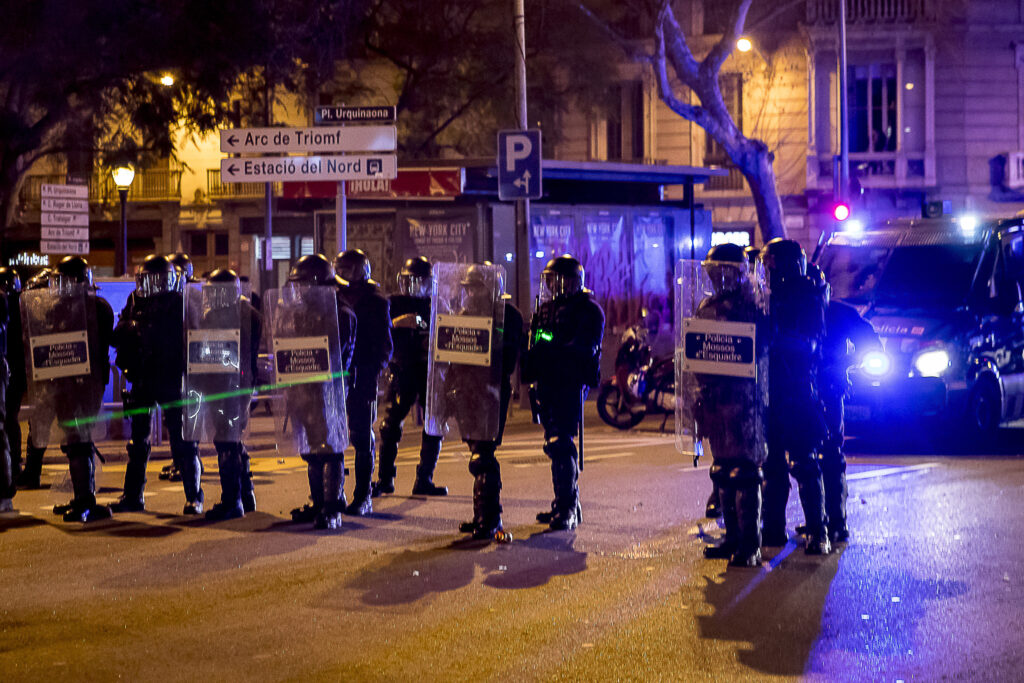22.02.2021 - 21:34
|
Actualització: 22.02.2021 - 22:34
For the seventh night in a row, protests were called on Monday in support of the rapper Pablo Hasel, jailed last Tuesday for glorifying terrorism and for slander against the Spanish monarchy, police and other institutions. The pro-independence protest network Committees in Defense of the Republic (CDR) led marches in towns and cities across Catalonia at 7 pm, including at the Arc de Triomf in Barcelona, and Girona’s plaça Primer d’Octubre, where 200 people gathered in a march without incidents.
In the Catalan capital, around 500 demonstrators, fewer than other days, marched under the rain from Arc de Triomf to Parc de la Ciutadella, and then to Via Laietana. Once outside the Spanish police station in that avenue, some threw objects such as a cocktail Molotov and glass bottles to the police guarding the building. Subsequently, the Catalan police urged them to stop throwing objects or otherwise they would launch an operation to disperse them.
Afterwards, some rally-goers reached the Eixample district and built some barricades to prevent the police from reaching them. A handful of dumpsters were burned down in Girona street, but fewer than in the first nights of protests.
Controversial police operation in Gràcia
The Catalan police handling of the riots in protest against the arrest of rapper Pablo Hasel over the last week continues in the spotlight. How public order is maintained and the role of the Catalan riot police are one of the key issues to the government talks taking place these days.
The artist’s detention after his conviction for some of his lyrics and tweets has sparked seven nights of unrest in several cities in Catalonia so far. A 19-year-old woman in Barcelona lost an eye to a foam bullet fired by an officer on Tuesday, during the first night of protests, and on Saturday, the Catalan police charged into protesters after cornering them on Barcelona’s Gran de Gràcia street.
Aquest vídeo mostra perfectament la càrrega policial que s'ha produït avui entre Lesseps i Fontana.@mossos han carregat des de dalt i des de baix posant en clar perill a les manifestants, generant aglomeracions. Hi ha persones ferides @interiorcatpic.twitter.com/QLkXUpvDcg
— IRIDIA (@centre_IRIDIA) February 20, 2021
Both events have sparked much criticism among human rights organizations, such as the Irídia group, who said the action in the Gràcia district put people “clearly at risk” because it created crowds – the NGO said some people ended up injured after the police operation.
Meanwhile, the interior minister, Miquel Sàmper, said no injuries were reported due to the incident in Gràcia and added that “only for one minute was a minimal use of force employed.” He added that the Mossos’ operation aimed to avoid the vandalism and looting reported in the past few days: “The riots and what we have witnessed this week are not the right to demonstrate.”
Yet, not everyone backed the police over Saturday’s events – for instance, the man who appointed Sàmper, the former president Quim Torra: “It is unacceptable in a country which we want freedom to express ourselves and demonstrate.”
On Friday, human rights groups Irídia and Amnesty International met with the interior ministry and the Mossos after having requested an independent investigation over the police handling of the riots and better mechanisms to control riot police officers, including making sure that their identification number can be seen at all times.


